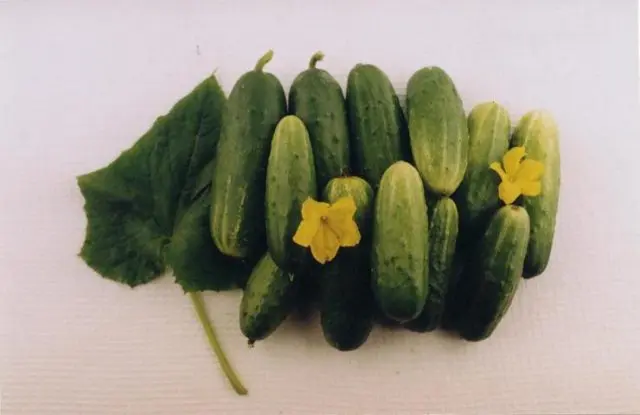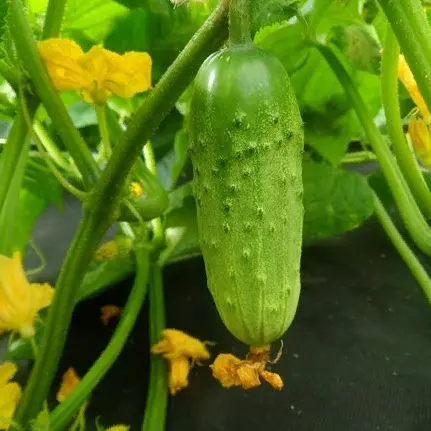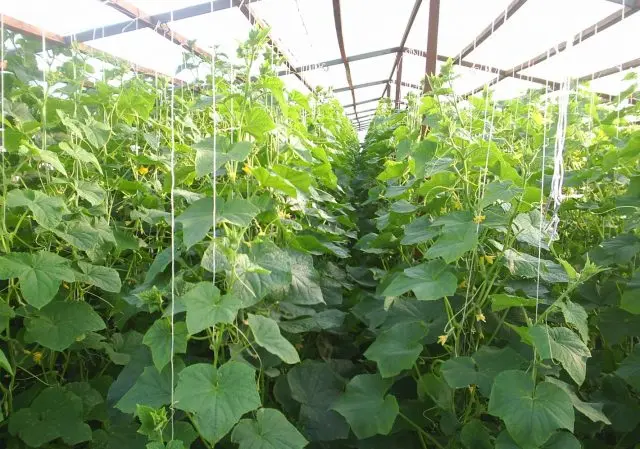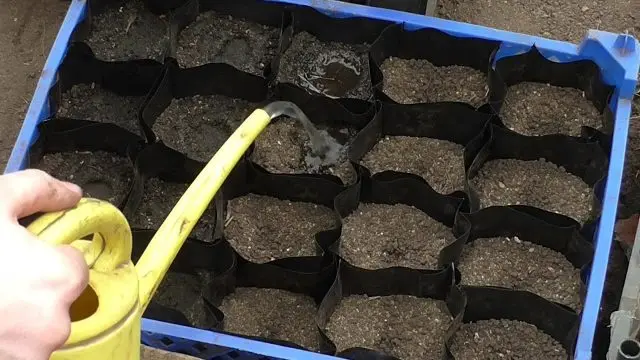Contents
Many gardeners dream of choosing the perfect cucumber variety for their garden. In most cases, in addition to the taste of cucumbers, you need to know which soil is best to use, the process of fruit ripening, and their versatility. Sometimes it may seem that there is no such variety that will be as close as possible to the ideal. Cucumber Khabar is a variety that contains all the benefits that are only present in cucumber species.
Description of the variety of cucumbers Khabar
Khabar cucumber variety is early ripe, has a universal purpose. In appearance it is indeterminate, the type of flowering is mixed, as stated by the manufacturer. Like any other cucumber varieties, Khabar should be tied up. In the process of fruiting, green fruits up to 11 cm long and up to 4 cm in diameter appear. A distinctive feature is the absence of bitterness and excellent taste. Below is a photo of Khabar cucumbers.

Detailed description of fruits
Ripe Khabar cucumbers have an elongated, slightly ovoid shape. The length varies from 10,5 to 11 cm, the diameter is about 4 cm. The peel is quite elastic, the density is medium. Cucumbers are green in color, there are light stripes of medium length and small round spots. Large bumps can be seen on the surface. The mass of the fetus varies between 90-100 g, but not more.
The pulp is quite juicy and at the same time dense, tender. The cucumber flavor is pronounced. A distinctive feature of the variety is the absence of bitterness. According to the data from the State Register, the taste qualities of the finished product were rated as “excellent”. Vegetable growers also adhere to this assessment and consider Khabar cucumbers to be the most delicious.
Characteristics of Khabar cucumbers
When considering the characteristics of the Khabar cucumber variety, special attention should be paid to the following points:
- Khabar cucumbers are early ripe varieties, which is a big plus when growing crops in regions with a short summer. From the moment when the seedlings have risen, about 45-50 days should pass, after which you can start harvesting.
- Long fruiting period.
- Stable yield every year.
- From each sq. m you can collect up to 4 kg of cucumbers. Thanks to such high rates, Khabar cucumbers have become popular with many farmers who grow crops for large-scale sales.
- More than 90% of cucumbers have excellent taste and presentation.
- Since this variety must be pollinated by bees, it is not recommended to plant it in greenhouses.
- High level of adaptation to urban conditions.
- A high level of fruiting, both in cold and hot regions of the country.
- A feature is increased resistance to the appearance of pests and a number of diseases.
- The leaf apparatus is restored quite quickly, as a result of which you can get a crop even in the most unfavorable conditions.
- If necessary, it can be transported over long distances without loss of presentation.
Due to its versatility, the fruits can be eaten fresh and used for canning.

Productivity
Cucumbers of the Khabar variety are distinguished by a high level of productivity. After they have been planted in open ground (seedling method), the finished crop can be harvested after 45-50 days. In order to obtain a high level of productivity, it is necessary to provide high-quality care for planting material. Thus, it is necessary to regularly water the crop, in the process of growth, apply mineral and organic fertilizers. In addition, it is necessary to carry out preventive measures against the appearance of pests and diseases.
Pest and disease resistance
As already mentioned, Khabar cucumbers are distinguished by a high level of resistance to many types of diseases and the appearance of pests. Despite this, it is recommended to consider the following recommendations, thanks to which the risk of pests will be minimized:
- it is not recommended to plant seeds of poor quality and material that has not undergone preliminary disinfection in open ground;
- planting seedlings or seeds is possible only in high-quality soil, in which fertilizers are applied;
- timely remove damaged and diseased plants;
- remove damaged parts of the bushes.
If pests appear on cucumbers, then it is worth using a sprayer and special chemicals.
Pros and cons of the variety
According to the description and photo, the Khabar variety cucumber has a number of advantages that make it possible to distinguish this crop from other varieties:
- bitterness is completely absent;
- high level of productivity;
- stable annual fruiting;
- the main advantage is the good preservation of the crop, as a result of which cucumbers can be transported over long distances;
- short ripening period, taking 45-50 days;
- high level of resistance to pests and diseases.
Among the shortcomings characteristic of this variety, we can distinguish:
- the presence of spikes on the surface of the fetus;
- high demands on the quality of the soil.
Before you buy Khabar cucumbers, it is important to understand that high yields will be obtained only with proper and high-quality care.
Growing rules
In the process of growing cucumbers Khabar, you should adhere to the following recommendations:
- During the season it is allowed to apply fertilizers and top dressing no more than 5 times.
- If organic and mineral fertilizers are used, it is recommended to apply them in turn, each time changing types.
- Watering should be regular. Before flowering, water 1 time every 5 days. For 1 sq. m should go away from 4 liters of water. At the time of flowering and abundant fruiting, the soil is irrigated once every 1 days, using up to 3 liters of water for every 10 sq. m.
If these recommendations are violated, then the yield will decrease significantly, in addition, there is a possibility of diseases.

Terms of sowing
Judging by the reviews, the Khabar cucumber variety is not as difficult to grow as it might seem to many inexperienced gardeners. Seedlings can be planted in open ground or seeds can be sown immediately. If the second method is chosen, then work is recommended to be carried out after the threat of frost has completely passed, and the temperature regime of the soil varies from + 15 ° С to + 20 ° С. At the same time, at night, the temperature should not fall below + 8 ° С.
If the seedling method is chosen, then planting material begins to grow in late April or early May. After the cucumbers are 20-25 days old, you can transfer them to a permanent place of growth – in open ground.
Choosing a place and preparing beds
Before you start planting planting material in open ground, you must first select and prepare a place. Since Khabar cucumbers are heat-loving, direct sunlight should fall on the selected piece of land. In addition, the site must be protected from strong winds.
Land preparation begins in the fall. To do this, the land must be carefully inspected, remove all debris, dig up the ground and remove weeds. It is important to consider that Khabar cucumbers do not grow in acidic soils, as a result of which it is recommended to add lime. In the spring, in the second half of April, the site is re-dug up, leveled, weeds are removed. Only after that you can make beds and plant cucumbers.
How to plant
Seedlings are planted in open ground on the 20-25th day, when 4 leaves appeared. Grooves or holes are made on previously prepared soil and the planting material is immersed to a depth of 1,5 cm to 2 cm. A distance of 0,5 m must be left between adjacent grooves. no more than 4 plants.

Aftercare for cucumbers
In the process of growth, the culture must be provided with quality care, only in this case, you can count on a good harvest. During the season, it is recommended to fertilize about 5 times, while different fertilizers should be alternated.
Before flowering, it is recommended to water the culture every 5 days, at the time of flowering and fruiting, watering is increased and carried out every 3 days. After irrigation, weeds should be removed.
Conclusion
Cucumber Khabar is a variety that really deserves special attention. This is due to the many benefits. A feature is a high level of resistance to many types of diseases and pests. In addition, the fruits are versatile, as a result of which they can be eaten fresh or used for canning.









